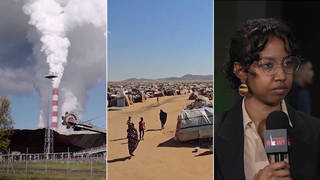HeadlinesJune 02, 2005
Three Bombings Rock Iraq
In Iraq, three suicide car bombs killed at least 16 people and wounded more than 50 others early this morning. One attack targeted bodyguards for a deputy prime minister, another went after a U.S. diplomatic convoy, and the third killed a political leader in Baquba. Two more US soldiers were killed bringing the number of U.S. troops killed in Iraq to 1,666.
LA Times: Suicide Bombings On Rise
This comes as The Los Angeles Times is reporting that suicide bombings have risen dramatically over the past several months. The paper says that 90 suicide attacks account for most of last month’s 750 deaths. The Times says that suicide attacks outpaced car bombings almost 2-to-1 in May and that in April, there were more suicide attacks than in the entire year preceding the June 28 hand-over.
Saddam Lawyer: Charge Him
Meanwhile, a lawyer for Saddam Hussein called on the Iraqi government to bring formal charges against the ousted Iraqi leader if it expects to put him on trial this summer. This comes a day after the president of Iraq’s transitional government, Jalal Talabani, said he hopes to see Saddam tried within two months. In a glimpse of one of Saddam’s possible defenses, his lawyer said forensic tests indicate the chemicals used against the Kurds in Halabja in 1988 “certainly did not come from Iraq.” He did not elaborate.
Annan Sacks First Official In Oil-For-Food Controversy
Now to the so-called UN Oil-for-food scandal. Secretary-General Kofi Annan has fired his first U.N. official in the controversy. The official, Joseph Stephanides, was a longtime UN diplomat. He was accused by a U.N.-appointed inquiry of steering a lucrative contract under the oil-for-food program to a British firm. He denied breaking any rules and vowed to appeal. Stephanides said “There were tremendous pressures to cut corners and accelerate the institutional arrangements because civilians were suffering in Iraq and oil-for-food had to be started as soon as possible…To make me the fall guy for that — this is really preposterous.”
US/EU to Hold Iraq Conference
In other Iraq news, the United States, the European Union and Iraq announced an international conference on Iraq. It will be held in Brussels, Belgium, on June 22.
Dutch Says No To EU Constitution
Voters in the Netherlands dealt a potentially fatal blow to the European constitution, delivering a massive No vote just three days after it was rejected by the French. Nearly two thirds of Dutch voters wanted the treaty thrown out. Analysts say the Dutch vote was the result of a combination of factors, some economic and others political. Here is a Socialist Party member of parliament, Krista van Velven: “Well first of all, this is the first time in fifty years that the Dutch people have been asked anything about the European Union, so they’ve been forced to take all the treaties, including the introduction of the Euro, which people are quite angry about. This is the first time they have been asked to say anything.” The Dutch vote on the constitution caused the Euro to drop even lower and Europe’s leaders will hold a summit later this month to try to contain the turmoil. The summit is likely to extend the November 2006 deadline for ratification in the hope that French and Dutch voters change their minds. Britain is now expected to cancel its planned referendum, and others including Ireland, the Czech Republic and Poland could follow.
Rumsfeld Says Amnesty Report on Guantanamo “Reprehensible”
Defense Secretary Donald Rumsfeld spent a good part of his news conference yesterday attacking human rights group Amnesty International. He called the group’s description of the Guantanamo prison as a “gulag” “reprehensible.” Rumsfeld said “Most would define a gulag as where the Soviet Union kept millions in forced labor concentration camps, or I suppose some might say where Saddam Hussein mutilated and murdered untold numbers because they held views unacceptable to his regime. To compare the United States and Guantanamo Bay to such atrocities cannot be excused.” Amnesty issued a statement noting that in the early weeks of the Iraq war, Rumsfeld at least three times cited Amnesty’s account of human rights violations by Iraq’s then-president, Saddam Hussein. The head of Amnesty USA, Bill Schulz said “Twenty years ago, Amnesty International was criticizing Saddam Hussein’s human rights abuses at the same time Donald Rumsfeld was courting him.”
Kuwaiti Charges He Was Tortured At Guantanamo
Meanwhile, more stories of torture and abuse continue to come out of Guantanamo. The first Kuwaiti to be released from the US run prison charged yesterday that he was subjected to psychological torture at Guantanamo. Eleven Kuwaitis are known to be at the prison.
Prominent Journalist Killed in Lebanon
In Lebanon, a prominent newspaper journalist was killed in a car bomb in a residential area of east Beirut. The journalist, Samir Qasir, was known as a supporter of Lebanon’s anti-Syria opposition. He is the most prominent Lebanese figure to be assassinated since former Prime Minister Rafik Hariri was killed in February.
Bush Says No To Africa Aid
President Bush made clear yesterday that he is opposed to doubling aid for Africa. That is one of the major proposals on the agenda for a summit meeting of industrial nations next month in Scotland. British Prime Minister Tony Blair has proposed that the world’s richest nations make a $25 billion increase in support for Africa. But asked about the issue yesterday, Bush said “It doesn’t fit our budgetary process.”
Israel Releases 400 Prisoners
Israel has begun the release of about 400 Palestinian prisoners as part of the second phase of the prisoner releases promised under a cease-fire agreement between Israeli Prime Minister General Ariel Sharon and Palestinian leader Mahmoud Abbas. About 500 Palestinian prisoners were freed in the first phase in late February.
Bolivia Heads Toward 'National Shutdown'
Massive protests continue to rock Bolivia and are spreading well beyond the capital La Paz. A planned session of the country’s Congress was postponed for a second straight day and indigenous-led protests have blockaded roads in various areas of the country. Jim Schultz of the Democracy Center in Cochabamba is now reporting that the country is heading for what he calls a “national shutdown.” Several governments, including the US, have issued travel warnings for Bolivia. Meanwhile, one of the most prominent opposition figures, Evo Morales, is warning that right-wing forces in the country may attempt to seize power in a military coup in an effort to prevent the indigenous led protesters from bringing down the US-backed government and taking power. At the center of the protests are the rights of the country’s majority indigenous population.
French Diplomat Killed in Haiti
In Haiti, France’s honorary consul to the country was shot and killed by a group of men who pulled him from his vehicle and stole his car. The killing comes less than a week after the US, French and Canadian governments issued travel warnings for Haiti, citing deteriorating security conditions and an upsurge in carjackings and kidnappings.
Venezuela Protests U.S. Position on Posada
The Venezuelan government yesterday formally protested the U.S. decision not to hand over Cuban-born terror suspect Luis Posada Carriles and said it would continue to seek his extradition. The Venezuelan Embassy in Washington said in a press statement that it sent a note to the U.S. State Department, protesting the US decision not to put Posada Carriles under preventive detention. He is currently in U.S. custody on unrelated immigration charges. The embassy said it would present more information to Washington to back up its extradition request. Venezuelan President Hugo Chavez said last month that Caracas could cut diplomatic ties with the U.S. unless Posada was turned over to Venezuela to face trial.
Pentagon Delays Release of Recruiting Data
The Pentagon has postponed by more than a week the release of military recruiting figures for May, as the Army and Marine Corps continue to face the worst recruiting crisis of their history. The military usually provide recruiting statistics on the first of every month. Asked whether the move was simply delaying the release of bad news, a military spokesperson said “That’s not necessarily true.”
Nine Inch Nails Pulled From MTV Ceremony Over Bush Picture
The music band, Nine Inch Nails, has pulled out of the MTV Movie Awards after clashing with the network over an image of President Bush that the band planned as a performance backdrop. The image was to accompany the song “The Hand That Feeds,” which criticizes the occupation of Iraq. MTV said in a statement it would have been “uncomfortable with their performance being built around a partisan political statement.” The leader of Nine Inch Nails, Trent Reznor, said on the band’s Web site that the image of Bush would have been unaltered. Reznor said “Apparently, the image of our president is as offensive to MTV as it is to me.”
Most popular
- 1
- 2
- 3
- 4
Non-commercial news needs your support
Please do your part today.











Media Options